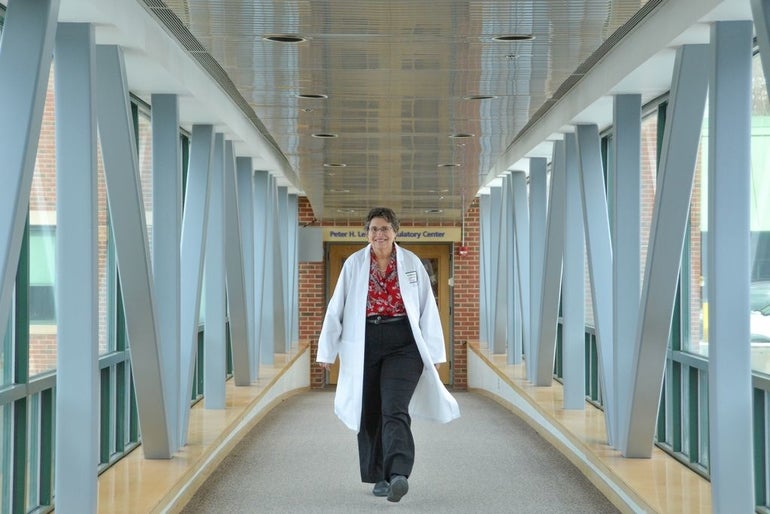Close to 3,000 babies are born each year in Massachusetts through what’s called assisted reproductive technology, when couples have difficulty conceiving.
None of those babies were born to couples who used in Central Massachusetts the most common reproductive assistance method, in vitro fertilization, or IVF.
Dr. Julia Johnson is looking to change that.
Johnson, the chair of the obstetrics and gynecology department at UMass Memorial Medical Center in Worcester, has raised most of the money she’ll need for the hospital to start building what Johnson said will be the first IVF clinic in Central Massachusetts.
“About one in eight couples have difficulty conceiving. So it’s a common issue,” Johnson said.
Johnson and the UMass Memorial administration are hoping to bring more family planning services to the Worcester campus and keep couples from having to travel to Waltham or Springfield – which are the closest IVF facilities today – for what can be invasive and uncomfortable procedures. Although demand for IVF procedures has been flat for the last five year, it has increased historically and new fertility trends point to greater IVF demand in the future.
Allowing women to work with their usual obstetrician or gynecologist can help keep women as comfortable as possible during the IVF process, Johnson said.
The IVF process, which includes injections, is considered emotionally and physically demanding. Women going through IVF treatments are sometimes advised to avoid strenuous activities or even be on bed rest for a few days, the health provider Kaiser Permanente says.
“It’s very personal,” Johnson said. “It’s very difficult to see someone you don’t know.”
400 procedures per year
UMass is looking to build a facility costing $1.3 to $1.4 million in a vacant space in an office building at 33 Kendall St., a block behind the main entrance to the hospital’s Memorial Campus.
Johnson has raised roughly $400,000 of the $500,000 she’ll need, with the same amount matched by the hospital. Johnson has raised funds through faculty and administration at the hospital.
Another $300,000 to $400,000 is planned to be raised once construction starts.
Johnson expects the facility to handle around 400 procedures a year, fewer than at nearby centers but a fairly significant amount of what Centers for Disease Control & Prevention data shows is around 9,000 IVF procedures and 3,000 births each year in Massachusetts, resulting from IVF or other reproductive procedures.
That could boost the number of deliveries the hospital sees each year. UMass Memorial had more than 4,200 deliveries last year, and Johnson said she expects that could increase by a few hundred more as couples choose to keep their pregnancy services close to home.
“They tend to stay at UMass because they have that connection,” Johnson said.
The future of fertility
IVF has long had a central role in Johnson’s career. She says she met the first baby born of IVF, who was born in 1978. In 1990, she opened what was Vermont’s first IVF clinic.
“Back then,” Johnson said, “the science behind it was very poorly understood.”
Success rates used to be around 10 percent for a woman getting pregnant through IVF, she said. Now, it’s around 35 percent.
With rising success rates has come a greater awareness and acceptance of impotence issues for couples. Many couples, particularly men, are still reluctant to talk about or seek help though, said Katherine Rotker, a urologist who joined UMass Memorial in 2017.
“This has a stigma, like many other medical conditions,” Rotker said. “Having trouble with fertility is something you’re not likely to share with friends.”
IVF can also be very expensive, with out-of-pocket costs of $10,000 to $15,000 per IVF cycle.
Fortunately for local couples, Massachusetts is one of just 16 states to mandate insurance coverage for fertility treatments, according to the National Infertility Association.
Medically assisted pregnancies have not risen considerably in Massachusetts in recent years, according to the CDC – the number is down slightly in the past five years – but is up 17 percent in the past 15 years.
Health trends indicate what could be a rising demand ahead: Couples are having children later, when conceiving can become more difficult, and male fertility rates have dropped sharply.
Massachusetts has one of the oldest rates at the age women first give birth, according to the National Center for Health Statistics.
The median age is 27 in Worcester County and 30 in Middlesex County, the 10th oldest rate in the country. The national median is 26. For counties with the population and density characteristics of Worcester County, that median has risen by a year and a half in the past decade.
Older women are more likely to use IVF, CDC statistics show. Nationally, 62 percent of women who use in vitro are 35 are older.
In the meantime, male fertility has been dropping, potentially increasing significantly the challenges of couples conceiving.
A major study published in 2017 in the fertility journal Human Reproduction Update found in North America and other parts of the world men’s sperm counts dropped in the previous four decades by 50 to 60 percent.
Theories attempting to explain that drop, Rotker said, include a much wider screening of the population these days. She sees a broader awareness of the issue as a good thing.
“There’s been an incredible growth in this field in the past few decades,” she said. “It has become common knowledge that tools like IVF exist, so people seek evaluation and care. There’s been a world of change in a short time in this field.”

